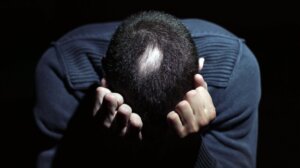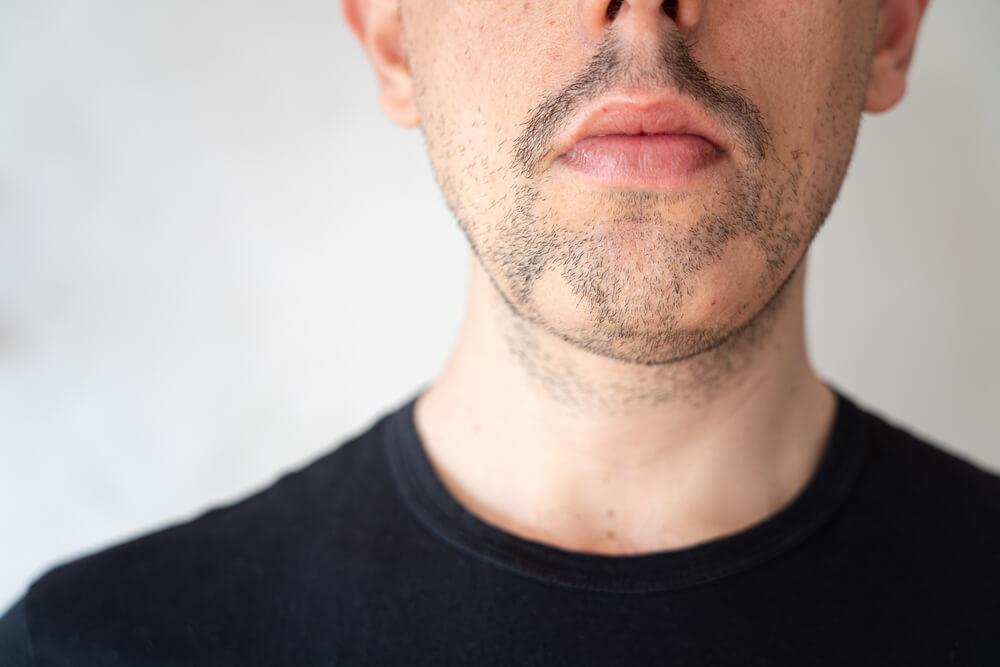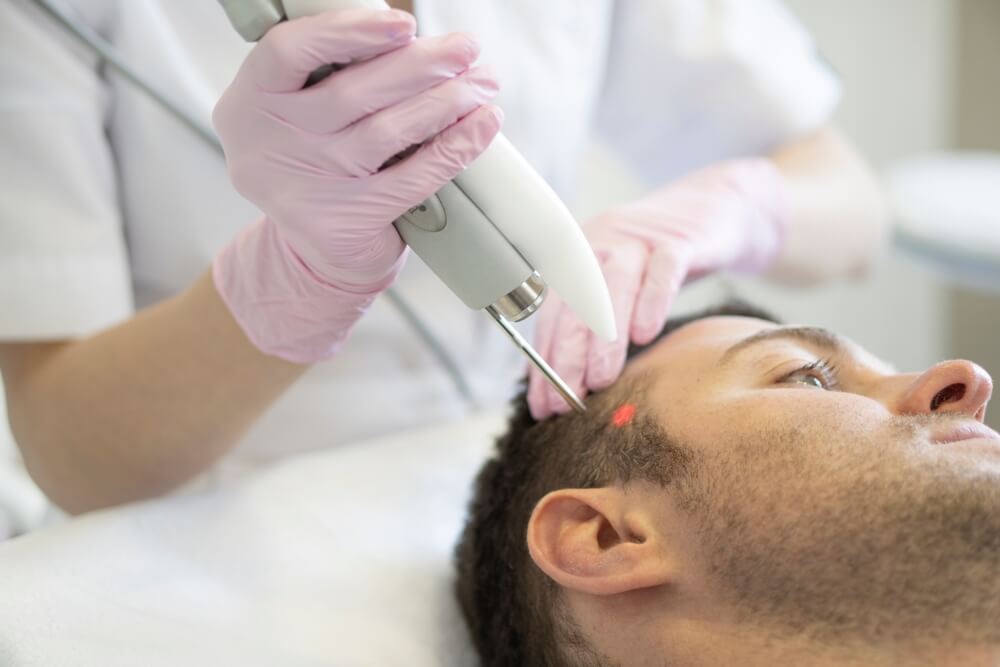The Link Between Alopecia Areata and Stress

There’s a definitive link between stress and hair loss. In fact, during critical periods, autoimmune responses can be produced that weaken the scalp and unavoidably lead to baldness.
Although alopecia doesn’t represent any danger to the individual’s health, it can trigger a deep discomfort accompanied by a decrease in their self-esteem. In addition to being a loss, alopecia also affects their physical image and, ultimately their identity, how they see themselves, value themselves, and their interactions with others.
Alopecia areata
Alopecia areata (AA) is a skin disease characterized by hair loss, both on the scalp and on other parts of the body. This condition generates well-defined patches that are the size and shape of a coin. In some cases, it can even cause complete hair loss.
The Mayo Clinic states that alopecia areata is one of three kinds of hair loss that are often associated with high levels of stress. It seems that, in the aftermath of these emotionally draining episodes, the immune system attacks the hair follicles. This causes hair loss over time.
Fortunately, with the help of professional treatments, when the problems or situations that caused stress are overcome, the hair can be recovered again. Today, there are some good dermatological clinics around that provide extremely helpful services in these situations. They offer treatments such as hair laser therapy, hair mesotherapy, or hair biostimulation with minoxidil.
Sufferers of alopecia areata should go for a medical assessment to discover the most appropriate treatment for their individual case. It’s a disorder that affects both women and men. In the latter, it can even occur in their beards. Therefore, seeking professional help is essential.

Recognizing if alopecia is due to stress
Anyone can suffer from alopecia areata. It’s the product of various nervous factors such as stress or anxiety derived from specific situations. In fact, the mismanagement of emotions can cause a series of symptoms, the most notable being hair loss.
Experiencing complex situations, such as the loss of a loved one, economic problems, or a relationship breakup can generate this problem. It usually manifests itself somewhere between the third and sixth month of the emotional stress.
However, it’s important to remember that, although this type of alopecia occurs as a result of high levels of nervousness, in most cases it’s usually temporary. Therefore, seeking psychological advice and leading a healthy lifestyle are usually great alternatives to solving the root problem or learning to manage it. That said, if mental health continues to be affected by external factors that generate anxiety and stress, it’s highly likely that the individual will continue to lose their hair. Naturally, this will end up affecting their self-esteem.
The different types of alopecia areata
Research suggests that patients of all ages, ethnicities, and gender suffer from alopecia areata. They often experience deep frustration due to the unpredictable nature of the disease. The condition causes a deterioration in their emotional well-being and self-esteem. Moreover, it presents a risk of suffering psychiatric comorbidities.
Depending on its severity, alopecia areata is classified into:
1. Common alopecia areata
According to data from the National Institutes of Health (NIH), this is the most frequent type. It’s characterized by the loss of hair in coin-sized areas. The most affected regions are the scalp, eyebrows, beard, armpits, and even the genital area.
This type is further subdivided into single plaque alopecia areata, which only affects a specific area of the scalp, and multiple plaque alopecia areata, where patches are generated in several areas that join together.
2. Alopecia areata totalis
This type occurs when the disease affects the entire scalp and total hair loss is inevitable. It’s usually closely related to episodes of great stress and low self-esteem. This type is even more common in those who suffer from phalacrophobia. Therefore, it’s recommended that sufferers seek professional help from the beginning so as not to allow it to progress too much.
3. Universal alopecia areata
In this type of alopecia, hair follicles throughout the body are affected. It generates the loss of eyebrows, eyelashes, and axillary and pubic hair. It’s an autoimmune disease whereby the body generates antibodies against a part of the hair follicle. In fact, it weakens them so much that there are no totally effective treatments.

Hair treatment for alopecia areata
There are several effective treatments that can help patients with alopecia areata restore the vitality of their hair. The first and most important is to seek psychological assistance to help control states of anxiety and stress. That’s because there are some personal events that can trigger harmful immune disorders for the scalp.
People suffering from alopecia areata can be severely psychologically impacted. For this reason, professional help is essential. Bearing in mind that it’s a disease caused by high levels of stress and nervousness, sufferers should try to attend therapy and lead a healthy life with a good diet, rest, and exercise. As a matter of fact, in many cases, this is enough for the hair to start growing again.
Some dermatological centers use laser therapy that prevents hair loss, stimulates growth, and increases its density. They also use hair mesotherapy based on vitamins, hyaluronic acid, coenzymes, and essential trace elements to reverse the degenerative process of scalp cells. Alternatively, they use oral or topical minoxidil for its vasodilator effect. It strengthens the hair and promotes its growth.
The combination of several techniques usually generates really good results. So, if you’ve been experiencing high levels of nervousness lately and have noticed that you have bald patches on your head, try to stay calm. As we mentioned earlier, it’s often the case that extreme situations have a severe effect on the body. For this reason, it’s essential to seek professional attention.
All cited sources were thoroughly reviewed by our team to ensure their quality, reliability, currency, and validity. The bibliography of this article was considered reliable and of academic or scientific accuracy.
- Hall-Flavin D. (2021). ¿El estrés puede causar la caída del cabello? Estilo de vida saludable Control del estrés. Clínica Mayo. Recuperado de: https://www.mayoclinic.org/es-es/healthy-lifestyle/stress-management/expert-answers/stress-and-hair-loss/faq-20057820
- Instituto Nacional de Artritis y Enfermedades Muscoesqueléticas y de la piel. (2021). Alopecia areata. Instituto Nacional de Artritis y Enfermedades Muscoesqueléticas y de la piel. Recuperado de: https://www.niams.nih.gov/es/informacion-de-salud/alopecia-areata#:~:text=La%20alopecia%20areata%20es%20una,en%20cualquier%20parte%20del%20cuerpo.
- Strazzulla LC, Wang EHC, Avila L, Lo Sicco K, Brinster N, Christiano AM, Shapiro J. (2018). Alopecia areata: Disease characteristics, clinical evaluation, and new perspectives on pathogenesis. J Am Acad Dermatol, 8, 1, 1-12. doi: 10.1016/j.jaad.2017.04.1141. PMID: 29241771. Recuperado de: https://pubmed.ncbi.nlm.nih.gov/29241771/
This text is provided for informational purposes only and does not replace consultation with a professional. If in doubt, consult your specialist.








